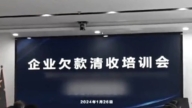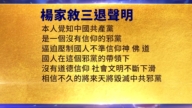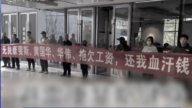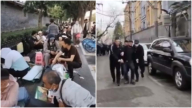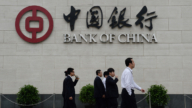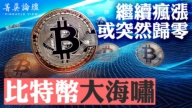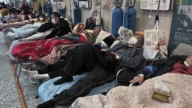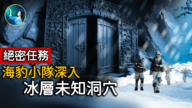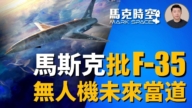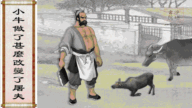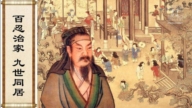【新唐人2011年12月1日讯】被誉为“中国经济学界良心”的著名经济学家吴敬琏近日发表演讲,敦促“下届政府要以改革的姿态高调亮相”。他警告,中国市场经济出现倒退,当局通过货币政策调整争取喘息的时间,以免爆发严重的通货膨胀和“硬着陆”,但是,转变经济增长方式不能只是口号挂在嘴上。
11月28号,在第14届“孙冶方经济科学奖颁奖大会暨经济发展方式转变与体制改革”高峰论坛上,吴敬琏指出,在过去相当长时期,中国经济增长是靠资源来拉动的。
他表示,现在中国宏观经济陷入了两难困境:如果继续松下去,资产泡沫就会到达临界点,房地产就可能崩盘,通胀可能向恶性的方向发展,所以,必须紧;但是,过去的增长是靠钱堆起来的,如果紧了以后,增长的势头也就失去了。
吴敬琏现任国务院发展研究中心学术委员会副主任、研究员、全国政协经济委员会副主任、《改革》杂志主编。
吴敬琏在演讲中提出了转变经济增长方式的五个方面。
不过,“纽约城市大学”经济学教授陈志飞,对中共体制下能否实现经济转型,表示质疑。
陈志飞:“我觉得吴先生他一贯对中国经济市场化是颇有见地,获得人们的尊重。从80年代末,他就跟随赵紫阳搞价格闯关,当时引起了业内人士的瞩目和尊敬。但是,通过六四以后这20多年,虽然在中国市场化的过程中他有很多的论述,我觉得只是他的一厢情愿。”
目前,有“世界加工厂”之称的中国沿海地区,由于企业成本提高,加上世界经济衰退,产品出口欧美市场越来越困难,许多企业面临困境,削减薪水、裁员等情况日益增多,引发新一波工人抗议示威风潮。
吴敬琏表示,中国能够成功应对亚洲金融危机,最关键的原因是中小企业的崛起。而今中小企业却出现了倒闭潮。他说,现在有改革回潮的迹象,出现了“国进民退”的大倒退。不改革国有经济、中国经济的整体效率难以得到提升,而且加速腐败和贫富两极分化。
他指出,国有企业不但在石油、电信、铁路、金融等关键领域处于垄断地位,而且得到国有银行的大量贷款迅速扩张;其次,各级政府在配置土地和资本等重要资源上,拥有巨大的权力;第三,各级政府通过投资项目审批、市场准入、价格管制等手段直接干预企业的微观经营活动。
北京天则经济研究所理事长茅于轼对此发表看法。
茅于轼:“在改革的前十几、二十年,由全面的计划经济变了市场经济,很多国有企业都卖掉了,民营企业有很大的发展,市场配置资源的功能越来越强。但是最近十年,这方面没有什么进展,甚至于有些倒退,国营企业是共产党的利益所在。”
吴敬琏在演讲中说,胡锦涛不久前在APEC峰会上表示,要减少政府对微观经济的干预。温家宝也有类似表述。吴敬琏强调,政府介入微观经济活动是极大的危险。
他指出,要实现经济转型,关键在于切切实实推进市场化改革,以及与此相关的政治改革和社会改革,改革的目地就是要消除转变发展方式的制度性障碍。
陈志飞:“政治改革实际上是一直被搁置,而且中共在政治统治手腕上更加强硬,人权记录上更加恶化。随着‘国进民退’现象的发生、中国经济体制发生的变化,政治改革不但没有向前进,反而也出现了类似‘国进民退’的现象,也出现了类似的倒退的现象。”
面对中国政治、经济和社会重重危机,吴敬琏说:“现在需要搞清楚的是,我们到底是需要一个有利于大多数人的市场经济,还是要一个由政府垄断的国家资本主义。”
新唐人记者易如、李元翰、孙宁采访报导。
What Does China Need? Market Economy or State Capitalism?
Known as “the conscience of China’s economic sector*",
Wu Jinglian, a renowned economist, in his recent speech,
urged the Chinese Communist Party (CCP) authorities’
“next administration to highly promote reformation."
Wu warned that China’s market-oriented economy
encountered setbacks, and the authorities should adopt
proper money policy to gain breathing time, avoiding an
outbreak of severe inflation and a hard landing.
Wu believes that the transformation of economic
growth should just not be a slogan.
On 28th November, at the summit forum during the award
presentation ceremony for the Sun Yefang Prize in
Economic Science & Transformation of Economic
Development and Economic System Reform, Wu Jinglian
pointed out that in a rather long period of time, China’s
economic growth was resource driven.
Wu said that China’s macro economy was caught in a dilemma.
If it continued to adopt easy monetary policy, the asset bubble
would reach tipping point, triggering a collapse in real estate.
Inflation would likely increase in a vicious trend.
So, the authorities should tighten monetary policy.
However, the economic growth in the past was propped up
by money, a tight policy would mean that
the growth momentum would be lost.
Wu Jinglian, is currently deputy director, research fellow of the
academic committee at the CCP State Council Development
Research Center, deputy director of the economic committee of
CCP’s Chinese People’s Political Consultative Conference and chief editor of Reform magazine.
In his speech, Wu Jinglian proposed five areas related to
the transformation of economic growth.
However, economics professor, Chen Zhifei, at the City
University of New York, questions whether the CCP can really achieve its proposed economic transformation.
Chen Zhifei: " Mr. Wu has always had insights on issues of
China’s market economy and has gained people’s respect.
Since the late 1980s, he followed the then CCP Premier,
Zhao Ziyang, to carry out pricing reform, drawing the industry insiders’ attention and respect.
But since the 4th June incident in 1989, for over 20 years,
though he has given lots of views on China’s markets,
I believe that’d be just his own wishful thinking."
Currently, China’s coastal areas, named as the world’s
factories, confront difficulties in exporting due to increasing business costs, and global economic recession.
More and more enterprises in this plight have to make
salary cuts, layoffs and the like, while triggering another wave of worker protests.
Wu Jinglian stated that China’s successful coping with
the Asian financial crisis mainly depended on
the rising of small and medium enterprises, which presently
were caught up in the tidal wave of business failure.
Wu pointed out that the fact of state-owned sector’s expanding
and private sector’s shrinking , was a major reform setback.
Without implementing reform on the state-owned economy,
the overall efficiency of China’s economy would be hard to improve upon,
and would accelerate corruption and wealth polarization.
that state-owned enterprises not only monopolized
in oil, telecommunications, railways, finance and other key areas,
but also rapidly expanded with backups from
state-owned banks’ massive loans.
Secondly, CCP authorities at all levels owned enormous power
to allocate land, capital and other important resources;
Thirdly, CCP authorities at all levels directly intervened in
enterprises’ micro business operations by means of approval for invested projects,
application of market access permits and
pricing control systems, etc.
Beijing-based Unirule Institute of Economics president,
Mao Yushi, comments,
Mao Yushi: “In the first ten years or twenty years,
a comprehensive planned economy became market-oriented.
Lots of state-owned enterprises were sold out,
private enterprises took a great leap, and the market-based resources allocation played its role better.
But in the last ten years we witnessed little progress in this
aspect, with regression arising in some cases.
The state-owned enterprise is the focus of CCP’s interest.”
In his speech, Wu Jinglian quoted CCP president Hu Jintao’s
remarks at the APEC summit as saying that
the government’s intervention in the micro-economic activities
would be reduced.
CCP Premier Wen Jiabao has also expressed similar things.
Wu stressed that it would be a huge danger if the government
Intervened in micro-economic activities.
Wu believed that the core of achieving systematic economic
reform lies in the down-to-earth promotion of market-oriented reforms,
as well as the associated reforms on political and the
social system.
The goal of reform should be the elimination of
institutional barriers to the change of development patterns.
Chen Zhifei: “The political reform has long been shelved in fact,
and the CCP has further tightened its political control.
The condition of human rights in China is getting worse.
Along with the occurrence of state-owned sector’s expanding
and private sector’s shrinking, plus economic system changes,
China’s political reform, far from advancing, but rather, arose a
situation similar to the state-owned sector’s expanding and private sector’s shrinking, a similar retrogression. “
In view of China’s political, economic and social crises,
Wu Jinglian said, “Now it’s necessary to figure out, what on earth is our demand?
A market economy in favor of the majority of the people,
or a state capitalism monopolized by the government? “
NTD reporters Yi Ru, Li Yuanhan and Sun Ning.


